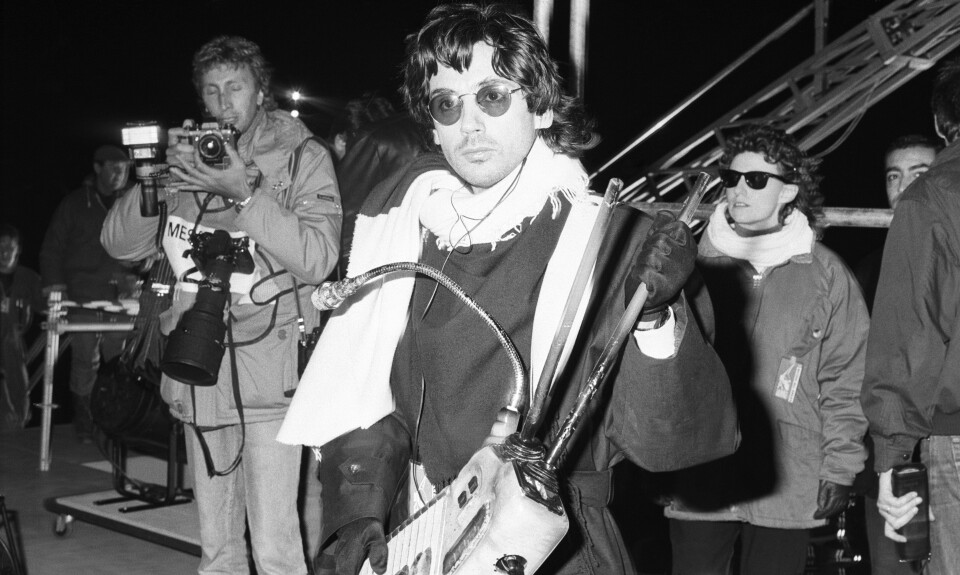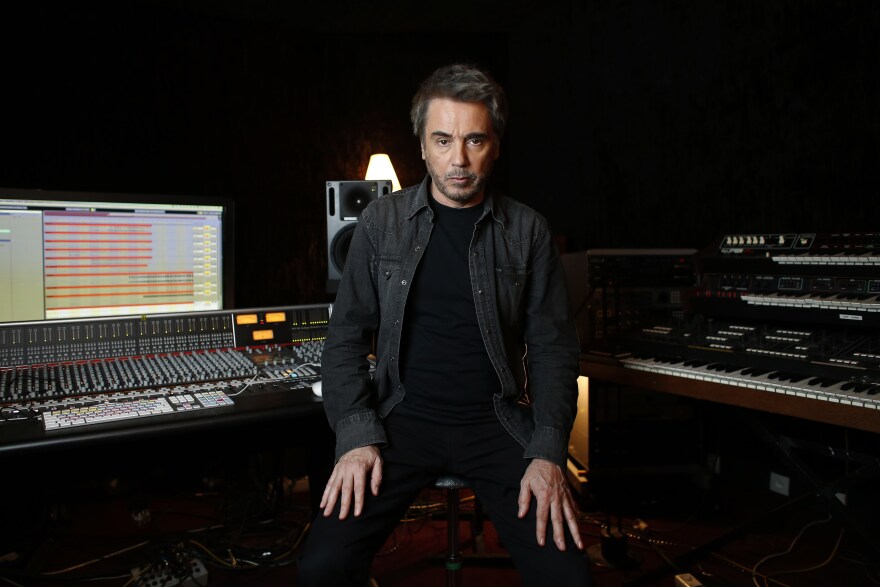French electronic music pioneer Jean-Michel Jarre — who's nominated for a Grammy this year — takes us on a journey through the past, present and future of the electronica genre; Five out of the last 10 films starring David Oyelowo were directed by women, including his latest, "A United Kingdom." He joins the show to explain why this is no accident; Later this month Hollywood studio execs and filmmakers may get a new relationship with China.
Jean-Michel Jarre fuses Snowden and synths for his rebellious 'Electronica' album project
UPDATE: Jean-Michel Jarre brings his Electronica World Tour to The Microsoft Theatre at LA Live on Saturday, May 27.
French electronic music pioneer Jean-Michel Jarre's album, “Electronica 1: The Time Machine,” has a Grammy nomination for Best Dance/Electronic Album.
But "Electronica 1" is actually just half of an ambitious two-album project that includes "Electronica 2: The Heart of Noise." For this ambitious project, Jarre recorded with more than 30 artists from all over the world, from the French band Air to the musician Moby to film director/composer John Carpenter. He even got cyber leaker Edward Snowden to pitch in.
Jarre was an early adopter of electronic music back in the 1970s, long before artists like Daft Punk and Skrillex topped the charts.
Interview Highlights:
On discovering electronic music:
I really discovered electronic music while I was quite involved with rock bands in France. It was in days where we had the student revolutions all over Europe — all over the world actually. Electronic music for me was an ideal way`of being a rebel against the establishment of classical music, and even the establishment of rock — approaching music not only based on notes, but actually doing music with sounds and noises. Recording the sound of the wind, the rain, the car on the street. It was totally revolutionary in those days. Today, everybody is doing this. Electronic music is everywhere. I've always been convinced that it would be a general way of approaching music composition, music production and even music distribution.

On getting his first synthesizer:
I sold my electric guitar and amp to get a synthesizer. It was the real rebellion against rock. The first synthesizer I got was a British one called the EMS VCS 3 — "The Putney." It's a legendary, early monophonic synthesizer. I'm still using it. I have a fetishist relationship with it. On each of my albums, including my recent "Electronica" album, I use it. It was one of my best investments of all time!
On electronic music's reputation for being emotionless:
Lots of people consider electronic music to be abstract and cold. I would say it's exactly the reverse. There is nothing more organic, more similar to cooking — cooking beats, loops, frequencies, waveforms in a very sensual way.
On giving birth to the musical ideas in "Electronica"
It could start from a sound or from your experiences in the days before. All the random elements will give birth to an interesting or boring idea. You don't know. For instance, I traveled a lot [for] this project. I was at one moment in a hotel in Los Angeles at the Chateau Marmont. You have these sprinklers in the garden, every day at the same time, around 6:30. Each time I was working on this track, I was listening to this beat. I loved it and I said, What is this? I was looking for the stems in my tracks and then I realized it was [the sprinklers]. I went out and recorded the sound and it became an integral part of the rhythmic section.
On the connection between his mother and Edward Snowden:
One of the recurring themes of "Electronica" is this ambiguous relationship that we have with technology. On one side we have the world in our pockets — in our smart phones — and on the other side we feel that we are spied on by the outside world. While I was recording "Electronica," I heard about Edward Snowden. Strangely enough, it made me think about my mother.
My mother was a great figure in the French resistance. She went in the French resistance in 1941 at the very beginning of WWII. At that time, the resistance were considered by the people as troublemakers, even some of them as traitors because they were just questioning the power in place. I've been raised with this idea that each time the power in place and the governors are generating ideas or actions, which may harm us and which may be negative for our community, somebody has to stand up against it. It's exactly what Edward Snowden did for all of us. We know that through time, through history, every social progress — the abolition of slavery, the right to vote for women — always, these social progresses have been done against the power in place. It's the only way to make our society evolve — questioning the system in place and the governors who [should] never forget that they are there to serve us and not the reverse.
I decided to contact Edward Snowden and I met a fantastic young man in love with his country, who wanted to improve his country. Obviously, he has no ambition to become an EDM star or an electronic musician. We decided he would just record two or three sentences saying the reason why he did what he did.

On the future of "Electronica" and technology:
I think I see that in our time, the real beginning of a total new era and a total new relationship with technology. I did "Electronica 1" and "2" collaborating with artists, but maybe in a near future, I will do "Electronica 3" collaborating with machines, because with artificial intelligence, it's going to change our society so much. As with generation after generation, we can only dream or have nightmares regarding the future. But we should not be scared because, so far, human beings have always succeeded in taming the technology and taming the future. We have to be optimistic by subversion.
What an 'extremely cordial' call between the US and China could mean for Hollywood
President Donald Trump this week had what he called an “extremely cordial” phone call with Chinese President Xi Jinping. And that could be very good news for Hollywood.
Later this month, the two countries will have their first chance in five years to renegotiate an agreement covering the release of American films in China.
Studio executives have their sights set on China expanding its foreign film limit beyond 34 movies a year, as well as getting a bigger share of Chinese box office revenues. But China may have the upper hand at the negotiating table.
Wall Street Journal reporter Erich Schwartzel has been covering Hollywood’s cinematic relationship with China. He says that with U.S. movie admissions flat, and DVD sales collapsing, Hollywood is relying on China’s growing film market more than ever.
Interview highlights:
On the importance of the Chinese film market to Hollywood:
China has filled a lot of roles for Hollywood these past couple of years because its box office has just been growing exponentially. It slowed down a little bit last year, but it's still seen as potentially taking over as the number one global box office, probably in the next two years or so. The returns there are growing, the theaters are being built at a clip. They now have more movie theaters than the U.S. It's the first time in history that the U.S. doesn't have the largest theatrical footprint, and that's going to affect the creative decisions that are being made by studios here in Los Angeles.
On China's influence over American movies and how much money they make:
China is so dominant that it can force Hollywood to play by its rules. And those rules really are onerous, especially when you look at other international markets where Hollywood movies are exported to. In China, the [U.S.] studios get only 25 percent of the box office revenue, compared to an average of 40 percent in other international markets. The Chinese authorities also get censorship approvals, and if they find objectionable content they might ask that it be removed or they might not approve its release at all.
To hear the full interview with WSJ reporter Erich Schwartzel, click the blue player above.




